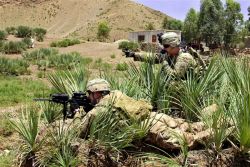WASHINGTON, June 20, 2011 — A new high-intensity workout regime promises to build strength and endurance. Ads tout dietary supplements as formula for getting stronger, smarter and even less-stressed-out. A “how to” book presents a sure-fire way to bounce back from physical or emotional setbacks.
With the wealth of ever-changing and often-conflicting information on the Internet and on the street, what are warfighters to believe about the best way to improve their performance, particularly in combat?
Getting to the bottom of that, and putting word out to the troops whose lives and missions depend on their ability to perform in demanding and often extreme conditions, is the mission of the Defense Department’s Human Performance Resource Center, Dr. Stephen Frost, the center’s director, told American Forces Press Service.
DOD stood up the center in September 2009 under the auspices of the Uniformed Services University of the Health Sciences to gather and develop solid science for warfighters, their leaders and their health care providers.
Part research arm, part information clearinghouse and education center, the center provides a single DOD focal point for human performance optimization, encouraging better coordination, collaboration and communication among the services and with other government agencies, Frost explained.
The staff seeks out scientifically proven data to post on its website and answers warfighters’ questions submitted through an online link. When it identifies an information gap, it reaches out to experts within the military and civilian professional communities to research the issue or evaluate research already conducted.
To date, the center has issued a White Paper on the pros and cons of a high-intensity physical training program popular with many military members. Its findings, in a nutshell: It may be great if you’re already fit, but could be too physically demanding if you’re not.
The staff also evaluated the prudence of taking specific dietary supplements in extreme temperatures or altitudes after some deployed service members experienced liver and kidney problems, Frost said. The results, posted on the center’s website, showed that high-protein supplements such as creatine can be extremely dangerous, especially when users aren’t properly hydrated, he reported.
“One of our missions is to provide the warfighter information that is evidence-based [and] scientific so that they can make decisions about things like dietary supplements in a better way than just ‘Googling’ on the Internet and getting commercialized information,” Frost said.
The center plans to look into possible ways to mitigate problems associated with the sickle cell trait. Another project on the center’s radar screen, to be conducted with NASA and the Defense Centers of Excellence for Psychological Health and Traumatic Brain Injury, will look into the issue of sleep, particularly sleep deprivation.
“That’s a big problem through the services,” Frost said. “We know that missions sometimes require warfighters to remain vigilant for long periods of time. So the big question is: How much sleep do you really need? And are there ways of enhancing your ability if you don’t have enough sleep? Are there ways of catching up on your sleep? There are a lot of questions around sleep that apply around the services, and NASA is interested, too.”
“Optimal performance” involves much more than strength, endurance and overall physical fitness, Frost explained. It includes all the mental, emotional and physical factors that impact a warfighters’ ability to perform effectively in demanding conditions and extreme environments, to stay healthy and injury-free and recover from any injuries and illnesses. This involves everything from what goes into their mouths to what kind of exercise routine they follow to behavioral issues such as drug, alcohol and tobacco use.
But equally important are what Frost calls “mind tactics” — a warfighter’s mental toughness and resilience.
“In the past, the emphasis has always been on the physical part, and we have become pretty good at managing the physical resilience and physical capabilities of our warfighters” he said. “But only recently have we come to recognize that the mind and body go together. So unless you have that same optimal capability for your mental performance, then your physical performance can’t be optimal, either.”
For this reason, the Human Performance Resource Center addresses family and social issues that can impact performance.
“We recognize that if a warfighter is worried about his family, he is not going to be in his optimal condition,” Frost said. “If he doesn’t have the social support systems he needs when he comes home from deployments, or if he is going to be deployed, he is not going to be in his optimal mental condition.”
Ultimately, Frost hopes the military community will come to recognize the Human Performance Resource Center as the place to go for unvarnished, scientifically proven information about factors that affect warfighter performance.
“If we can get the Human Performance Resource Center to truly become the go-to place for our warfighters, our health care providers, the line leadership and researchers so they aren’t simply Googling for information, I think we can go a long way toward enhancing the coordination, communication and collaboration among the services and DOD around human performance,” Frost said. “I think that will be a wonderful goal.”
Source:
U.S. Department of Defense
Office of the Assistant Secretary of Defense (Public Affairs)

 von
von 